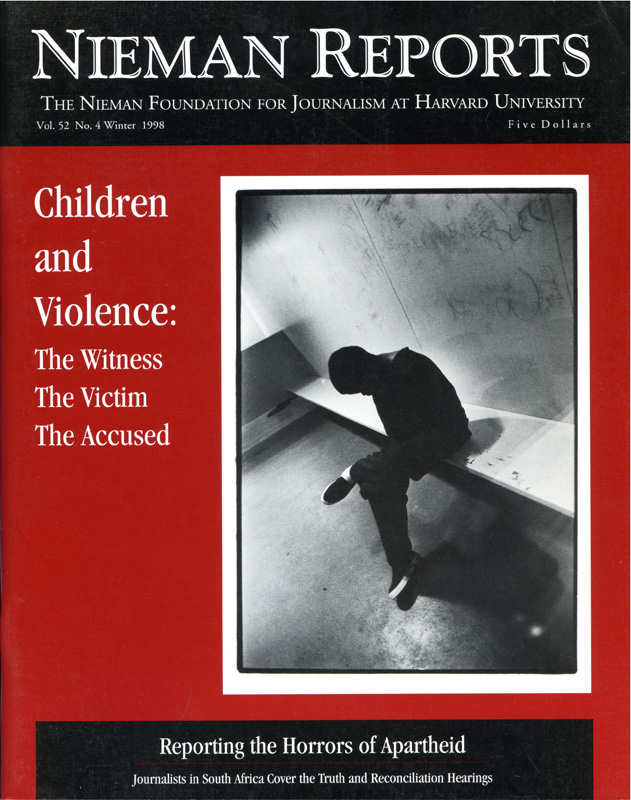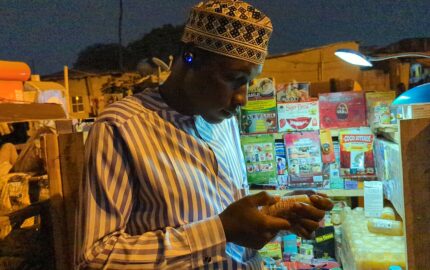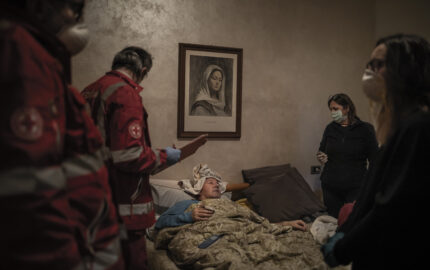
Don Mattera sits at the wooden table addressing the truth com missioners, in an ebony dashiki with white embroidery. He spreads his large hands and cites the Czech novelist Milan Kundera. The struggle in South Africa, he says, is also the “struggle for memory against forgetting.” Mattera is a poet and was once a journalist; banned from that profession by the government and placed under house arrest, he describes himself now as a wordsmith. But today he speaks of the time he spent as a journalist.
“I found at The Star, you had to be a white person to mean something,” he tells the commissioners. “I saw myself [at The Star] helping to open up columns for black people but there was no place for me.”
This tall, gray-haired man spreads his hands again, denying with his body the bitterness in his words. Freedom lost, a career denied. He is here to tell the midwife of memory: the Truth Commission. “I saw the media as just another terrain of struggle,” Mattera says, divided, as the country is, between and within itself.
Indeed, a mainstream newspaper could provide a home for Moegsien Williams, now Editor of The Cape Argus. Classified “colored,” or mixed-race in apartheid South Africa, Williams says he entered his job “with anger in his heart to write about the evil of apartheid.” And another mainstream newspaper provided a home for a spy with the security police, the still shameless Craig Kotze, who saw his mission as being “to balance an inherent bias in the English liberal media against the police.”
This same mainstream media provided a home for a whole generation of young journalists in the eighties, including myself, who, like Moegsien, believed we could do good by exposing evil. I think, for a time, we were defeated.
As a labor reporter in 1982 on a Cape Town English-language daily, The Argus, my first story made the front page. It was about striking milk delivery workers, African migrants in the then hostile Western Cape. The next story—about a strike in a steel factory—was placed inside, heavily edited. “Ah,” explained the news editor, “when readers don’t get their milk delivered, that’s a big story, but they aren’t interested in other strikes.” This brought home to me the realization that the reference point for most English newspapers was how whites were affected by what we were reporting; black reporters understood this, too, but for them, it was an even more bitter reality to endure.
“When I arrived at The Star,” Mattera told the Truth Commission, “I found fawning, cringing black people. They sat in a separate corner of the newsroom and ate in a separate canteen.” I do not remember a separate canteen at The Argus, but I do remember the white editors regarded our one black reporter with suspicion. He was bound to be biased, they said, especially in covering “black” stories such as squatter raids.
White editors, of course, regarded themselves as devoid of ideology. One former Argus editor says in the Independent group’s submission to the Truth Commission that they “[adhered] to independent, honest and responsible standards that [did] not pander to personal or sectional interests, but [were] concerned solely with the public interest.”
There were, however, some editors who practiced the kind of journalism about which others only preached. For instance, my first editor at The Argus, John O’Malley, seemed to have a keen sense of natural justice and carried with him a continuing outrage at the racial injustice in South Africa. He encouraged our coverage of the sprawling, beleaguered squatter camps around Cape Town that were a direct result of the cruel, unworkable pass laws that Africans were subject to.
After O’Malley retired, these stories were no longer given priority status. Reporters would sometimes return from squatter raids after they had seen sobbing mothers arrested and separated from their children and poor people fleeing in terror from large khaki-clad men. The chief sub-editor would ask pleasantly, “Anyone dead?”
Sensing failure, we’d answer no, knowing what his response would be. “Not a big story then,” he’d reply.
Sometimes, we didn’t even try to get our stories into our newspaper, but sent them to the journalistic godsend the “alternative” Weekly Mail, an anti-apartheid newspaper set up and owned by journalists of Sparks’s defunct Rand Daily Mail, a paper closed down by its owners, one of the major mining and industrial monopolies of South Africa.
Arrie de Beer, a former journalist from the Afrikaans press, told members of the Truth Commission during its special hearing on the media, “Our history was not only one of pain, but also of ignorance.” Pain was all too apparent, especially among black journalists. Pain, accompanied by anger.
My then colleague, Denis Cruywagen, now Deputy Editor of The Pretoria News, and Willie de Klerk, an Argus photographer, both of whom were classified “colored” under apartheid, were the only local journalists who witnessed the notorious Trojan Horse shooting in the middle class colored suburb of Athlone in Cape Town. A South African Railways truck had crawled slowly up and down the length of a suburban street at the height of the 1985 unrest. Once, twice, a third time. Defiant children stoned it. Armed policemen leapt out, opening fire, killing three: a teenager, a young man, and a boy of eight.
My newspaper had the story. We had the pictures. After a long, impassioned argument, the then editor agreed to use the picture, postage-stamp size, on page three. The lead story that day was about soldiers who had been injured when their military vehicle overturned in a township.
Mike Tissong, now Editor of The (mainly African-read) Sowetan, recalled in his submission to the Truth Commission how he and correspondent Rich Mkhondo had covered the gruesome death of six youngsters in Duduza, an African township southeast of Johannesburg. The children were blown apart by booby-trapped hand grenades. “Our contacts were adamant that a security policeman had infiltrated the group…and given them grenades which were set to explode as soon as the pins were pulled,” he testified. A white reporter was asked to get the police version, and the story eventually ran as one of “mystery blasts.”
Now, more than a decade later, former police operative Joe Mamasela, who, although black, was one of apartheid’s most deadly and efficient assassins, has admitted publicly that he had given the youths the grenades.
Generally, the rule during the state of emergency imposed by the government in the 1980’s and internalized by many newspapers “was that if the police didn’t confirm it, it didn’t really happen.” In part, this rule worked because enforcers of it had embedded themselves in various media outlets.
Viv McPherson, a security policeman, was perhaps the most informative person to appear before the Truth Commission. He recalled how the police infiltrated and manipulated the media. The most blatant example was The Sunday Times story that ran the day after the army had killed ANC refugees and other civilians in Botswana.
“The Guns of Gaborone,” its headline trumpeted. It was all planned beforehand, McPherson told the Commission.
“You knew beforehand, everyone knew beforehand, that people were going to be killed?” Truth Commissioner Hugh Lewin asked McPherson. Lewin, a journalist and writer of note and a former political prisoner and exile, now runs the Institute for the Advancement of Journalism in South Africa. Yes, even the story was planned beforehand, McPherson replied. His budget for fighting apartheid’s battle on media terrain was R50,000 (in 1980’s exchange rates, about $25,000). “It was quite cheap,” he said. It might have been inexpensive then, but we’re paying now.
In a telling interchange at the Commission, Lewin read Kotze the ex-spy one of his own stories, in which he’d quoted then police minister Adriaan Vlok, who attacked Archbishop Desmond Tutu, now the Chairman of the Truth and Reconciliation Commission, then the Anglican Archbishop. Tutu was afforded no right of reply.
“All your stories,” said Lewin, “follow exactly the same pattern. “They quote the police, they quote Vlok, they quote intelligence sources and they quote nobody else.” And the editors published them.
Perhaps they trusted Kotze because he was more like them. He drank in the same bars, laughed at the same jokes. I left the mainstream press in despair in 1986 and joined an “alternative” pro-black trade union publication, The Labour Bulletin. I spent much of that year monitoring the detention of black workers under the emergency regulations, asking companies whether they were paying them while they were jailed without trial.
Most were not. “Whites get paid when they go to the army,” one worker told me indignantly. “Why not us when we go into detention?”
Jail was, after all, a kind of “national service for black people.” This was echoed by Thami Mazwai, who complained that black journalists were not allowed to belong to banned organizations, while white reporters fought in the South African Defense Force “and even went to vote,” as though exercising a racially exclusive franchise was worse than killing people.
White editors were, in my mind, not inherently bad people but allowed themselves to be shielded from all this by blinkers. They simply didn’t see this world. Today, the struggle for all of us in South Africa is not only to remember what we lived through, but also to try to rekindle a sense of idealism that we felt when we tried to expose the wrongs of apartheid. Perhaps Max du Preez, former editor of The Vrye Weekblad (the brave alternative Afrikaans newspaper bled to death by lawsuits) and now a pioneering television journalist, offers us the best example of how that can be done. Dirk Coetzee, a key member of the South African death squads which operated with government sanction, approached The Sunday Times and Rapport, an Afrikaans Sunday paper, almost two years before Vrye Weekblad published its series of terrifying stories about the number of political activists and others secretly murdered by apartheid’s operatives. But those newspapers “chased him away” and closed their ears to his unpalatable ideas.
How many lives might have been saved if the public had known the truth earlier, du Preez wondered.
Earlier at the Commission hearing on the media, a former television news producer who’d worked for the state broadcaster when it was little more than a mouthpiece of the ruling party gave a half-hearted apology for not following up on the death squad stories. His staff had tried, he said, but couldn’t confirm the stories.
“I should tell him,” said du Preez, who, an Afrikaner himself, was excoriated by powerful Afrikaners for the journalism he practiced, “that if you want information on police death squads, then you don’t go to the government’s minister.” Basic lessons in basic journalism. If these are heeded, then perhaps du Preez’s plea to “restore the public image and public status of journalists” will be realized and we will be able to do our jobs with undiluted pride. And in Mattera’s words, we will then “all be free to be ourselves.”
Pippa Green is Deputy Editor of The Sunday Independent, Johannesburg, and a 1999 Nieman Fellow.


